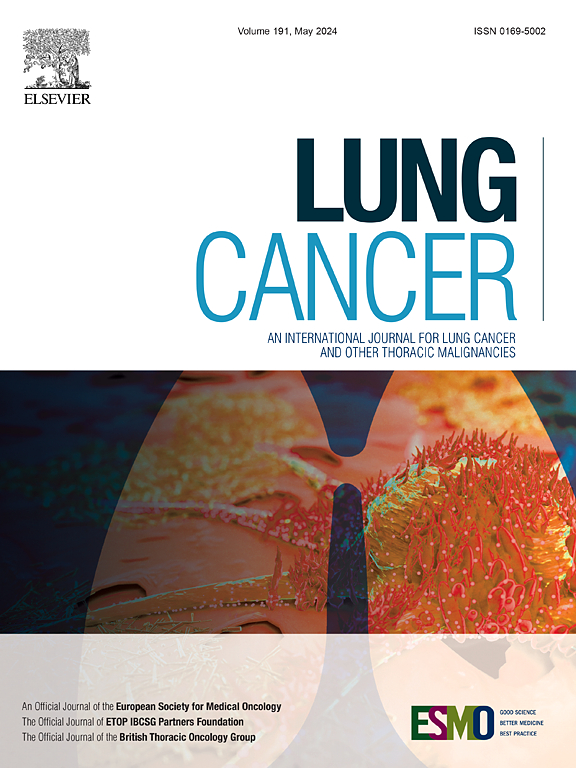Stratifying risk in oligoprogressive EGFR-mutated non-small cell lung cancer (NSCLC): The role of liquid biopsy
IF 4.4
2区 医学
Q1 ONCOLOGY
引用次数: 0
Abstract
Background
EGFR-TKIs have markedly enhanced outcomes for non-small cell lung cancer (NSCLC) patients, but resistance development is virtually inevitable. In the context of oligoprogressive disease (OPD), local treatments can target resistant clones while EGFR-TKIs maintain systemic control, potentially extending the duration of therapy. However, identifying patients who benefit from this combined approach remains unclear.
Methods
We conducted a retrospective study on advanced EGFR-NSCLC patients with OPD during TKI therapy, treated with local therapy and continued TKI. Serum liquid biopsies for ctDNA EGFR mutations were performed at oligoprogression. We assessed the effect of liquid biopsy status and relevant clinical variables on progression-free survival-2 (PFS2; OPD to progression), overall survival-2 (OS2; OPD to death), overall survival-1 (OS1; diagnosis to death) and time to TKI discontinuation (TTD; TKI initiation to discontinuation).
Results
Among 84 patients, 70 had liquid biopsies, with 56 % testing positive for ctDNA. A positive liquid biopsy was associated with worse PFS2 (4.99 vs. 11.73 months, p < 0.001), OS2, OS1 and TTD. In stratified analysis, CNS oligoprogression showed no PFS2 difference by liquid biopsy status, whereas non-CNS oligoprogression revealed a significant difference (5.13 vs. 13.70 months, p < 0.001). Univariate analysis linked shorter PFS1, CNS progression, poor PS, high carcinoembryonic antigen, and non-SBRT radiotherapy to worse PFS2, while multivariate analysis identified liquid biopsy positivity as the only independent factor.
Conclusions
Liquid biopsy status is a significant prognostic marker in extracranial EGFR-oligoprogressive NSCLC, suggesting its potential in identifying patients who may benefit from continued TKI and local therapies. Further prospective studies are warranted to confirm these findings and explore alternative treatment strategies for OPD.
低进行性egfr突变的非小细胞肺癌(NSCLC)的分层风险:液体活检的作用
degfr - tkis可显著提高非小细胞肺癌(NSCLC)患者的预后,但耐药发展几乎不可避免。在少进行性疾病(OPD)的情况下,局部治疗可以针对耐药克隆,而EGFR-TKIs保持全身控制,可能延长治疗时间。然而,确定从这种联合方法中获益的患者仍不清楚。方法回顾性研究晚期EGFR-NSCLC患者在TKI治疗期间的OPD,局部治疗和继续TKI治疗。血清活检ctDNA EGFR突变进行寡进展。我们评估了液体活检状态和相关临床变量对无进展生存-2 (PFS2; OPD至进展)、总生存-2 (OS2; OPD至死亡)、总生存-1 (OS1;诊断至死亡)和TKI停药时间(TTD; TKI起始至停药)的影响。结果84例患者中,70例进行了液体活检,56%的患者ctDNA检测呈阳性。液体活检阳性与较差的PFS2 (4.99 vs 11.73个月,p < 0.001)、OS2、OS1和TTD相关。在分层分析中,液体活检状态下,中枢神经系统低进展显示PFS2无差异,而非中枢神经系统低进展显示显著差异(5.13 vs 13.70个月,p < 0.001)。单因素分析将PFS1缩短、中枢神经系统进展、PS差、癌胚抗原高、非sbrt放疗与PFS2加重联系起来,而多因素分析发现液体活检阳性是唯一的独立因素。结论:液体活检状态是颅外egfr -少进展NSCLC的重要预后指标,提示其在识别可能受益于持续TKI和局部治疗的患者方面具有潜力。需要进一步的前瞻性研究来证实这些发现并探索OPD的替代治疗策略。
本文章由计算机程序翻译,如有差异,请以英文原文为准。
求助全文
约1分钟内获得全文
求助全文
来源期刊

Lung Cancer
医学-呼吸系统
CiteScore
9.40
自引率
3.80%
发文量
407
审稿时长
25 days
期刊介绍:
Lung Cancer is an international publication covering the clinical, translational and basic science of malignancies of the lung and chest region.Original research articles, early reports, review articles, editorials and correspondence covering the prevention, epidemiology and etiology, basic biology, pathology, clinical assessment, surgery, chemotherapy, radiotherapy, combined treatment modalities, other treatment modalities and outcomes of lung cancer are welcome.
 求助内容:
求助内容: 应助结果提醒方式:
应助结果提醒方式:


